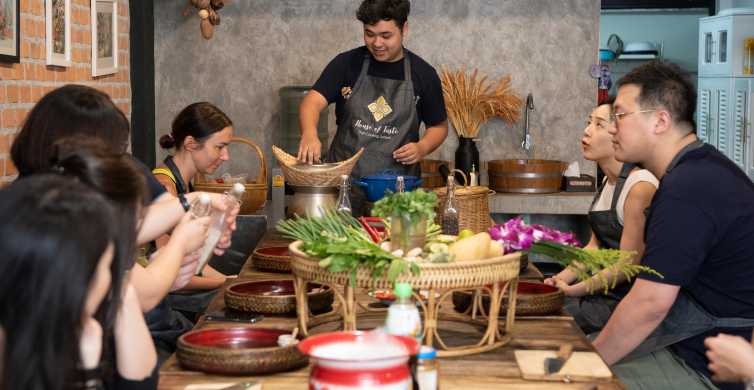Thailand is known for its distinctive and savory food, which combines a wide range of fresh ingredients, potent spices, and eye-catching hues.
In this article, we look at culinary schools in Thailand.
Thai cuisine offers a wide variety of delicacies that are sure to tempt the taste buds of every food enthusiast, from street food carts to high-end restaurants.
Recommended: 3 Top Environmental Issues in Thailand & Their Solutions
Attending a culinary school in Thailand can be a great option if you love to cook and want to learn about the diverse culinary traditions of that country. These are some arguments in favor of doing so:
Why Attending a Culinary School in Thailand is a Great Option
- Learn from the best
- Immerse yourself in the culture
- Use fresh, regional ingredients
- Increase your job options:
Learn from the best:
Thailand is home to some of the world’s most respected chefs and culinary specialists, who have acquired their abilities through years of experience in the local food sector.
You can learn directly from these professionals and obtain a deeper comprehension of Thai cooking methods and customs by enrolling in a culinary school in Thailand.
Immerse yourself in the culture:
Thai cuisine is closely tied to the nation’s cultural history, and enrolling in a culinary program in Thailand enables you to do just that.
You will have the chance to discover the origins and customs of the meals you make and develop a deeper understanding of the significance of food in Thai culture.
Use fresh, regional ingredients:
Herbs, spices, and tropical fruits are among the many fresh, tasty items that can be found in plenty in Thailand.
You may get a hands-on introduction to these ingredients and learn how to use them in your cooking to produce delectable, genuine Thai dishes by enrolling in a culinary school in Thailand.
Increase your job options:
Thai cuisine is becoming more and more well-known all over the world, and enrolling in a culinary school in Thailand can help you gain the expertise you’ll need to succeed in this expanding field.
Attending a culinary school in Thailand can help you realize your goals, regardless of whether you want to start your own restaurant, work as a chef in a prestigious restaurant, or simply improve your cooking abilities at home.
Some of the Thai cuisine’s must-try dishes include Massaman Curry, a rich and creamy curry cooked with beef or chicken and potatoes, Tom Yum Goong, a spicy and sour soup with shrimp and lemongrass, and Pad Thai, stir-fried noodles with shrimp, tofu, and veggies.
In conclusion, enrolling in a culinary school in Thailand is a great way to learn about the varied and rich world of Thai cuisine and get a greater understanding of the traditions and culture that shape it.
Whether you are a seasoned chef or simply a food enthusiast with a passion for cooking, a culinary school in Thailand may help you develop your talents, broaden your career options, and produce delicious, genuine Thai cuisine that will satisfy your taste buds and dazzle your friends and family.
The list of Culinary Schools in Thailand
Thai cuisine is well known for combining fresh ingredients, potent spices, and lively tastes to produce some of the most delectable dishes in the entire world. Attending a culinary school in Thailand might be a great option for individuals who love to cook and want to learn about the distinctive flavors of Thai food.
Some of the best culinary schools in Thailand that provide a variety of courses for aspiring cooks and food lovers are listed below:
Le Cordon Bleu Dusit Culinary School
This prestigious culinary school in Bangkok is part of the global Le Cordon Bleu network and offers a range of diploma and certificate programs in Thai and international cuisine. Students can pick up tips from seasoned chefs and get practical training in cutting-edge facilities. Find more information here.
The Blue Elephant Cooking School
With locations in Bangkok and Phuket, The Blue Elephant Cooking School provides students with in-depth understandings of Thai cuisine and culture through immersive cooking classes. Street food to royal cuisine can all be learned to prepare by students. Find more information here.
Bangkok Thai Cooking Academy
This cooking school, which is situated in the city’s center, provides a variety of courses for both novice and seasoned chefs. In addition to teaching students how to make traditional Thai dishes, fusion cuisine that combines Thai and foreign flavors is also available. Find more information here.
Pum Thai Restaurant and Cooking School
This popular cooking school in Chiang Mai offers hands-on classes that teach students to prepare authentic Northern Thai dishes. In addition to developing their culinary and cultural knowledge, students can learn how to prepare meals using fresh ingredients and time-honored methods. Find more information here.
Silom Thai Cooking School
Located in the bustling Silom neighborhood of Bangkok, this cooking school offers a range of courses that focus on classic Thai dishes, as well as vegetarian and vegan options. In a laid-back and welcoming environment, students can learn to cook and take their meals home to enjoy with loved ones. Find more information here.
Baipai Thai Cooking School
Located in a picturesque area outside of Bangkok, Baipai Thai Cooking School offers comprehensive cooking courses that incorporate practical instruction with cultural experiences.
Along with exploring nearby markets and visiting organic farms, students can learn how to make a variety of traditional Thai dishes. Find more information here.
In conclusion, enrolling in a culinary school in Thailand can be a great way to discover the distinctive and varied flavors of Thai food and learn more about the traditions and culture that have shaped it.
There are many culinary schools in Thailand that provide intensive and hands-on programs for students of various levels, regardless of whether you are an experienced chef or simply a food enthusiast with a passion for cooking.
You may learn from seasoned chefs, work with fresh ingredients, and make delicious, authentic Thai cuisine that will surprise your friends and family by selecting a culinary school in Thailand.
Employment Outlook and Salary of Chefs in Thailand
There are several job prospects for prospective chefs and food experts in Thailand’s expanding culinary industry. With so many restaurants, hotels, and resorts wanting to hire talented and professional chefs to satisfy the rising demand for high-quality cuisine, the job outlook for chefs in Thailand is favorable.
Chef Employment Prospects in Thailand
According to the World Tourism Organization, Thailand is one of the most visited nations in the world, with over 40 million visitors in 2019. As a result, Thailand’s food and hospitality sector significantly contributes to the nation’s economy and offers many job opportunities for chefs and other culinary experts.
The restaurant sector is a large employer of cooks in Thailand, with many restaurants serving a varied range of cuisines, from traditional Thai meals to cosmopolitan influences.
Another big employer of chefs is the hotel and resort sector, as many upscale hotels and resorts provide their visitors with upscale dining experiences.
Many Thai cooks are finding professional possibilities abroad, working in restaurants, hotels, and resorts in nations like the United States, Canada, and Australia, as Thai food gains appeal around the world.
Thailand’s Chefs’ Wages
Thai cooks earn a variety of salaries depending on their expertise, region, and the kind of restaurant they work in. Nonetheless, in general, chefs in Thailand may expect to earn a competitive income that is in line with industry standards.
According to data from PayScale, the average compensation for a chef in Thailand is roughly ฿350,000 per year. The amount of experience and the type of establishment they work in, however, can affect this. For instance, cooks employed by upscale eateries or five-star hotels may make substantially more money than those employed by independent businesses.
Thai cooks may additionally receive incentives, paid time off, health insurance, and paid time off in addition to their base pay. Also, a lot of chefs have the chance to earn commissions and tips on the meals they create, which can greatly increase their income.
Thai Chefs’ Opportunities for Career Advancement
There are numerous options for those seeking to further their careers in Thailand’s culinary field. Many chefs begin their careers as line cooks or prep cooks before moving up to positions like executive chef or sous chef.
Thai chefs may find employment opportunities in catering businesses, cooking schools, and food production facilities in addition to working in restaurants and hotels. Additionally, some chefs opt to launch their own enterprises, such as food trucks, catering services, or little restaurants.
For Thai chefs, professional development is a crucial component of career advancement. Throughout the nation, there are many culinary schools and training programs that give chefs the chance to learn new skills, develop new techniques, and increase their knowledge of the food industry.
In conclusion, there are many opportunities available in the expanding food and hospitality industries in Thailand, making the employment outlook for chefs favorable.
For those who have a passion for food and cooking, becoming a chef in Thailand can be a rewarding and fulfilling career choice with a competitive salary and the chance for career advancement.
Visa Requirements to Study in Thailand
Thailand has grown to be a popular study abroad location for international students. Together with a lively culture and inviting community, the nation provides a wide selection of academic programs at both the undergraduate and graduate levels.
Yet, it is crucial to comprehend the visa criteria and procedure for international students before making any plans to study in Thailand.
A Non-Immigrant ED visa is required for international students who intend to further their studies in Thailand. This particular sort of visa is intended for visitors who want to enroll in a Thai university or college. The initial 90-day validity of the visa may be extended for a maximum of one year.
International students must first submit an application to a Thai educational institution and receive a letter of admission before they may apply for a Non-Immigrant ED visa.
The student’s home country’s Thai embassy or consulate must receive the acceptance letter along with the requisite visa application paperwork, which includes a current passport, passport photos, and evidence of financial support.
Also, students must show confirmation that they have health insurance that covers them while they are traveling in Thailand. They must also go through a medical examination and get a medical certificate from an authorized doctor in their country of residence.
Students can go to Thailand after their visa has been approved, but they have seven days to report to their school. For the remainder of their program, the institution will now help the student acquire a student visa extension.
Thailand Student Visa Extensions
To extend their stay in Thailand, international students must apply for a visa extension at least 30 days before their existing visa expires. Depending on how long the student’s academic program is, the extension may be granted for a maximum of one year.
Students must show confirmation of their continuous enrolment in an educational program and evidence of financial support for the duration of their stay in Thailand in order to be granted a visa extension. Students might also be asked to show documentation of their attendance and academic advancement.
Working as an International Student in Thailand
Foreign students in Thailand are permitted to work part-time while they are enrolled in classes, but they must first have a work permit. To get a work permit, students must present confirmation of their enrolment in an educational program and obtain a letter of permission from their educational institution.
The work permit is valid for up to one year and permits students to work up to 20 hours per week during the academic year and up to 40 hours per week during academic breaks.
Conclusion
For international students, studying in Thailand can be a wonderful experience, but it’s crucial to comprehend the visa procedures and criteria before making travel plans.
For international students, getting a Non-Immigrant ED visa, getting a student visa extension, and getting a work permit if they intend to work while they study are necessary processes.
International students can take advantage of everything Thailand has to offer while pursuing their academic objectives with careful planning and preparation.


